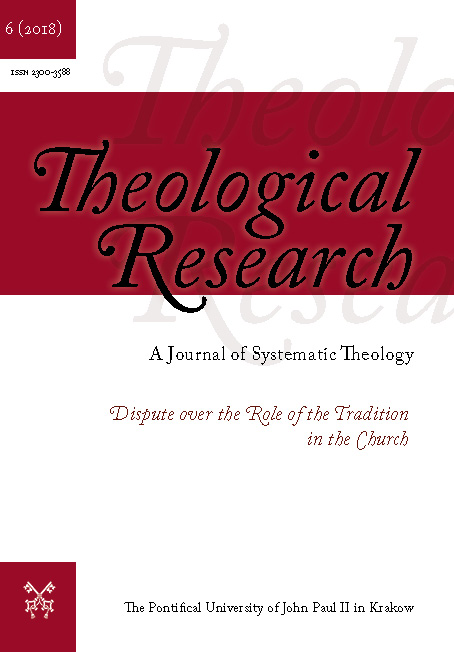Rola Tradycji w Kościele. Między „archeologizmem” a „entuzjazmem”
DOI:
https://doi.org/10.15633/thr.3523Słowa kluczowe:
tradition, hermeneutic of continuity, hermeneutic of ruptureAbstrakt
The article is an attempt to answer the question about the relation between tradition and the development of theological cognition. The church from the first centuries was aware that allegiance to the council tenets exceeds a technical repetition of council`s formulas. It is clear that a belief in dogma assumes openness to both the past and the future.
In the article two approaches to tradition are criticized: archeological and enthusiastic. The first one is linked with attempt to end the possibility of adding to a developing tradition further at any point in history; the second one is a result of conviction that currents form of doctrine and church are exactly what is wanted by God.
In reference to K. Rahner, J. Ratzinger and W. Kasper the typological‑sacramental meaning of the tradition was proposed. It lets us – basing on the statements of the Vatican II – overcome a progressivist hermeneutic of rupture and go toward a hermeneutic of continuity and to the real reform of the church. In other words, it means that the process of reception and realization of Jesus` teaching and of the history of Christianity lives on and every epoch, every culture and every generation has a task to deepen and to better understand all revelation given to us by Christ. It must be done with a sensitivity to the historical, cultural and religious contexts of every period of history including the present.
Bibliografia
Beinert W., Das entschiedene Jein. Über Ursachen und Grundlagen des Fundamentalismus der Gegenwart, „Renovatio“ 51 (1995), s. 43–57.
Cuda J., Wiarygodna antropologia. Hermeneutyczny zarys teologii fundamentalnej, Katowice 2002.
Hryniewicz W., Wiara rodzi się w dialogu, pod red. R. M. Rynkowskiego, Kraków 2015.
Kasper W., Evangelium und Dogma. Grundlegung der Dogmatik, Freiburg im Br. 2015 (Walter Kasper Gesammelte Schriften, 7).
Kasper W., Katholische Kirche. Wesen – Wirklichkeit – Sendung, Freiburg im Br. 2011.
Kasper W., Tradition als Erkenntnisprinzip. Systematische Überlegungen zur theologischen Relevanz der Geschichte, w: W. Kasper, Evangelium und Dogma. Grundlegung der Dogmatik, Freiburg im Br. 2015, s. 483–507 (Walter Kasper Gesammelte Schriften, 7).
Kasper W., Tradition als theologisches Erkenntnisprinzip, w: W. Kasper, Evangelium und Dogma. Grundlegung der Dogmatik, Freiburg im Br. 2015, s. 508–542 (Walter Kasper Gesammelte Schriften, 7).
Kern W., Niemann F.‑J., Theologische Erkenntnislehre, Düsseldorf 1981 (Leitfaden Theologie, 4).
Klausnitzer W., Christliche Offenbarungslehre. Lehrbuch der Fundamentaltheologie für Studierende, Religionslehrer und Religionslehrerinnen, Heiligenkreuz 2016.
Klausnitzer W., Grundkurs katholische Theologie: Geschichte. Disziplinen. Biografien, Innsbruck 2002.
Klausnitzer W., Prymat papieża, „Roczniki Teologiczne” 62 (2015), s. 131–160.
Kongregacja Nauki Wiary, Deklaracja „Mysterium Ecclesiae” o katolickiej doktrynie o Kościele przeciw niektórym współczesnym błędom, w: W trosce o pełnię wiary. Dokumenty Kongregacji Nauki Wiary 1966–1994, tłum. i oprac. Z. Zimowski, J. Królikowski, Tarnów 1997, s. 54–64.
Müller G. L., Katholische Dogmatik. Für Studium und Praxis der Theologie, Freiburg im Br. 19962.
Rahner K., Historia dogmatów i teologii z wczoraj i dziś, w: K. Rahner, Pisma wybrane, t. 1, tłum. G. Bubel, Kraków 2005, s. 90–124.
Rahner K., Überlegungen zur Dogmenentwicklung, w: K. Rahner, Schriften zur Theologie, t. 4, Einsiedeln 19675, s. 11–50.
Rahner K., Was ist eine dogmatische Aussage?, w: K. Rahner, Schriften zur Theologie, t. 5, Einsiedeln 19642, s. 54–81.
Ratzinger J., Glaube in Schrift und Tradition. Zur Theologischen Prinzipienlehre, Freiburg im Br. 2016 (Joseph Ratzinger Gesammelte Schriften, 9/1).
Ratzinger J., Anthropologische Grundlegung des Begriffs Überlieferung, w: J. Ratzinger, Glaube in Schrift und Tradition. Zur Theologischen Prinzipienlehre, Freiburg im Br. 2016, s. 476–497 (Joseph Ratzinger Gesammelte Schriften, 9/1).
Ratzinger J., O nauczaniu II Soboru Watykańskiego. Formułowanie – Przekaz – Interpretacja, tłum. W. Szymona, Lublin 2016 (Opera Omnia, 7/1).
Ratzinger J., Objawienie – Pismo – Tradycja. Tekst św. Bonawentury i jego znaczenie dla teologii współczesnej, w: J. Ratzinger, Rozumienie objawienia i teologia historii według Bonawentury. Rozprawa habilitacyjna i studia nad Bonawenturą, tłum. J. Merecki, Lublin 2014 s. 619–635 (Opera Omnia, 2).
Ratzinger J., Das Problem der Dogmengeschichte in der Sicht der katholischen Theologie, w J. Ratzinger, Glaube in Schrift und Tradition. Zur Theologischen Prinzipienlehre, Freiburg im Br. 2016, s. 553–580 (Joseph Ratzinger Gesammelte Schriften, 9/1).
Ratzinger J., Rozumienie objawienia i teologia historii według Bonawentury. Rozprawa habilitacyjna i studia nad Bonawenturą, tłum. J. Merecki, Lublin 2014 (Opera Omnia, 2).
Sesboüé B., Poza Kościołem nie ma zbawienia. Historia formuły i problemy interpretacyjne, tłum. A. Kuryś, Poznań 2007.
Werbick J., Den Glauben verantworten. Eine Fundamentaltheologie, Freiburg im Br. 2000.
Pobrania
Opublikowane
Numer
Dział
Licencja
Prawa autorskie (c) 2020 Krystian Kałuża

Praca jest udostępniana na licencji Creative Commons Attribution-NonCommercial-NoDerivatives 3.0 Unported License.
Autrzy publikujący w czasopiśmie "Theological Research" zgadzają się na następujące zasady:
a. Autorzy przenoszą na rzecz Uniwersytetu Jana Pawła II w Krakowie (UPJPII) autorskie prawa majątkowe do swoich tekstów.
b. UPJPII udostępnia teksty na platformie wydawniczej, na licencji Creative Commons Uznanie autorstwa-Użycie niekomercyjne-Bez utworów zależnych 3.0 Polska, która umożliwia ich pobieranie i udostępnianie (np. w repozytoriach naukowych), o ile zostaną spełnione warunki:
- podany autor i tytuł tekstu,
- podane miejsce publikacji (tytuł czasopisma i adres internetowy do oryginalnie opublikowanego tekstu),
- tekst będzie dystrybuowany w sposób niekomercyjny.

